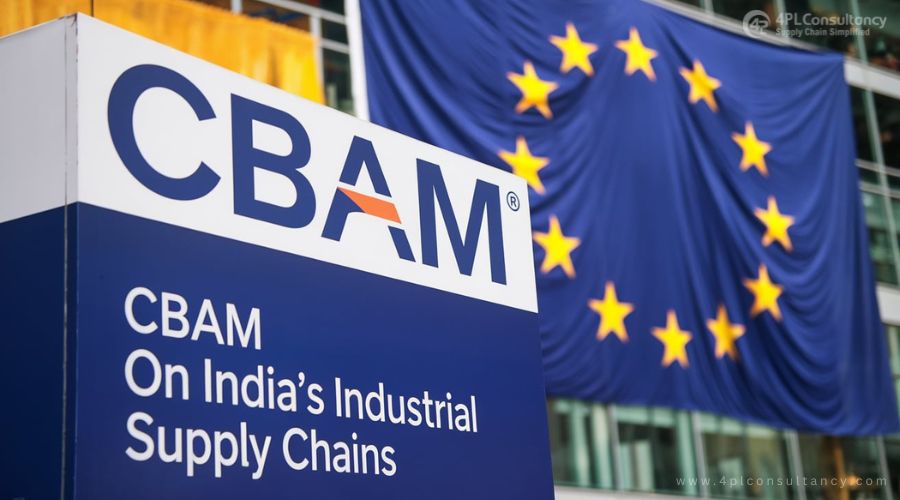Blog Details

Impact Of CBAM On India's Industrial Supply Chains
CBAM: India's Supply Chain in the Spotlight
The Carbon Border Adjustment Mechanism (CBAM) is a pivotal policy instrument designed to tackle carbon emissions globally by imposing tariffs on carbon-intensive imports into the European Union (EU). As countries worldwide ramp up efforts to combat climate change, CBAM is emerging as a critical tool that could reshape global trade, especially for countries like India, where the supply chain's carbon footprint is substantial.
Understanding CBAM and Its Global Relevance
CBAM is essentially a carbon tax on imports, designed to level the playing field between EU industries and their counterparts in countries with less stringent climate policies. It ensures that imported goods are subject to the same carbon costs as those produced within the EU, preventing what is known as carbon leakage—where companies relocate production to countries with lower environmental standards to avoid the costs of carbon emissions.
The EU's CBAM is set to come into full effect by 2026, targeting sectors like steel, cement, aluminum, and fertilizers—industries that are significant contributors to CO2 emissions. For India, a major exporter of these goods, this policy could have profound implications for its supply chain, especially in terms of compliance, cost, and competitiveness.
CO2 Emissions and Legal Aspects in Indian Industries
India is the third-largest emitter of CO2 globally, and its industrial sectors contribute significantly to these emissions. The introduction of CBAM could necessitate a fundamental shift in how Indian industries approach sustainability and carbon management.
From a legal perspective, Indian companies will need to navigate the complexities of CBAM compliance, which includes accurately calculating and reporting their carbon footprints. This could lead to increased operational costs, as businesses may need to invest in cleaner technologies or purchase carbon credits to offset their emissions. Additionally, Indian exporters to the EU will be required to provide detailed documentation of their carbon emissions, adding a layer of legal and administrative burden.
Challenges and Benefits of CBAM for India
One of the primary challenges of CBAM for India is the potential increase in production costs. Industries that rely heavily on carbon-intensive processes may find themselves at a disadvantage in the global market, particularly when exporting to the EU. The cost of compliance with CBAM regulations could be substantial, requiring investments in green technologies and process optimization.
However, CBAM also presents an opportunity for Indian industries to innovate and lead in the global transition to a low-carbon economy. By adopting cleaner technologies and improving energy efficiency, Indian companies can enhance their competitiveness not only in the EU market but globally. Moreover, aligning with CBAM requirements could open up new avenues for trade with environmentally-conscious markets, positioning India as a leader in sustainable manufacturing.
CBAM as a Solution: The EU Example
The EU's CBAM is a pioneering example of how policy can drive environmental change. By placing a price on carbon, the EU aims to reduce emissions and encourage other countries to strengthen their climate policies. For India, CBAM could serve as a catalyst for domestic policy reforms, particularly in industries that are heavily reliant on fossil fuels.
The Indian government could take a proactive approach by introducing similar measures domestically, such as a national carbon tax or incentives for green technology adoption. This would not only prepare Indian industries for CBAM but also contribute to the country's broader climate goals.
Scope and Obligations of CBAM
The scope of CBAM is broad, covering a range of carbon-intensive goods. Indian exporters to the EU will need to adhere to stringent reporting and compliance requirements, including the accurate measurement of carbon emissions throughout their supply chains. This will necessitate significant investments in carbon accounting and reporting infrastructure.
Moreover, Indian companies may need to establish long-term strategies to reduce their carbon footprints, such as switching to renewable energy sources, optimizing supply chain processes, and engaging in carbon offset projects. Failure to comply with CBAM obligations could result in tariffs that erode profit margins and reduce competitiveness in the EU market.
Impact on Indian Businesses and Industries
The influence of CBAM on Indian businesses and industries is expected to be profound. Companies that are proactive in reducing their carbon emissions will likely have a competitive advantage in the EU market. In contrast, those that are slow to adapt may face significant challenges, including higher costs and potential loss of market share.
The automotive, steel, and textile industries are among the sectors that will be most affected by CBAM. These industries will need to invest in cleaner production processes, improve supply chain transparency, and engage with global partners to ensure compliance. The transition to a low-carbon supply chain may also require Indian companies to collaborate with international stakeholders, such as technology providers and sustainability experts, to meet CBAM standards.
Government Intentions and Future Prospects
The Indian government has expressed its commitment to sustainable development and reducing carbon emissions. The introduction of CBAM could accelerate the adoption of green policies and technologies across various sectors. The government may also explore trade agreements and collaborations with the EU to mitigate the impact of CBAM on Indian exporters.
In the long term, CBAM could drive significant innovation in India's supply chain, leading to the development of new industries and job opportunities in the green economy. As global demand for low-carbon products increases, Indian companies that embrace sustainability will be well-positioned to thrive in the new market landscape.
Final Thoughts: CBAM as a Policy for the Future
CBAM represents a significant shift in global trade dynamics, with far-reaching implications for India's supply chain. While the challenges are substantial, the potential benefits of aligning with CBAM requirements are equally significant. Indian industries have the opportunity to lead the way in sustainable manufacturing, positioning themselves as global leaders in the low-carbon economy.
The future of CBAM in India will depend on the willingness of businesses, industries, and the government to embrace change and invest in a sustainable future. By taking proactive steps to reduce carbon emissions and enhance supply chain transparency, India can turn CBAM from a challenge into an opportunity for growth and innovation.
4PL Consultancy has a team of experts in Tariff classifications of wide variety of Product lines – Medical spares, Aerospace, Radiation Oncology machines & spares etc.





